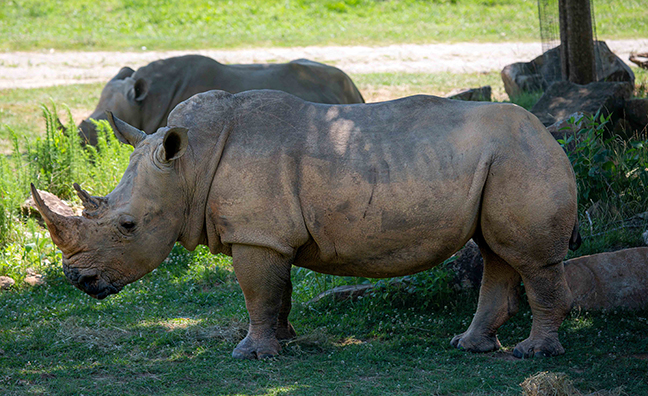Welcome!

With her three children living in zoos elsewhere, Natalie took on ‘auntie’ duties when new calves were born at the NC Zoo in 2020, zookeepers say. NC Zoo
A rhino with a big personality
Debbie Fuchs
NC Zoo
ASHEBORO — The North Carolina Zoo announced the death last week of Natalie, a southern white rhinoceros who was euthanized on Jan. 10 after a period of declining health.
Zookeepers said Natalie, 30, had a personality that matched her big 4,000-plus pound size. Southern white rhinos are the second-largest land mammal after elephants.
The veterinarian and animal care teams had been treating Natalie for chronic kidney failure, anemia and multisystemic disease for the past several months.
“Unfortunately, her health was in a steep decline despite treatment efforts, which led to a decrease in quality of life,” said Associate Veterinarian for the North Carolina Zoo, Dr. Tim Georoff. “The animal care and vet teams made the difficult decision to euthanize Natalie when treatment efforts were no longer effective."
Georoff said that the full pathology report will provide more information about Natalie’s condition in the coming weeks.
Natalie arrived at the North Carolina Zoo with her son Lyonnel in 2007. She had previously lived most of her life at White Oak Conservation Center in Florida, where she gave birth to two males named Tony and Dominique. All three of her offspring are still living at other accredited zoos in North America.
Southern white rhinos are the most social of the rhino species and live together in groupings called "crashes." Rhinos in the wild live into their early 30s and can live into their early 40s under human care.
The North Carolina Zoo now has a rhino crash of seven females — Linda, Kit, Abby, Nandi, Bonnie, Jojo and Mguu.
Natalie was a tough, independent female when she arrived at the Zoo who gradually softened through the years, said Animal Management Supervisor Jade Tuttle, who spoke for the rhino keepers.
“She was an experienced mother and took on the ‘auntie’ role with our first set of calves in 2020 as they started to disperse from their mothers,” Tuttle said.
“She was a very smart rhino, often leaving us wondering who was training whom. In her declining health, she began to seek out affection from staff and was dedicated to her bestie, rhino Abby. Her wild spirit was one of a kind, and she will be missed by our crash.”
Southern white rhinos were hunted to near extinction by the beginning of the 20th century for their horns, which some erroneously believe provide medicinal benefits. Rhino horn is made up of keratin, the same material that makes up human fingernails and hair.
The threat faced by wild rhinos is very real. Today, populations in the wild (estimated between approximately 19,000-21,000) still face significant threats from poaching and habitat loss.
Southern white rhinos have two horns, grow to 12-13 feet long, up to six feet from hoof to shoulder, and weigh 4,000 to 5,000 pounds at full maturity.
These gentle giants are herbivores and graze on grass, which helps maintain the diverse African grasslands, increase plant diversity and provide grazing areas for other animals that share their natural habitat: The savannahs of Africa. Rhinos at the zoo have a similar diet, getting most of their food while grazing the 40 acres of the Watani Grasslands.
In addition to their work with the rhinos at the North Carolina Zoo, staff works on conservation projects in several countries in Southern Africa to save this species. Through SMART (Spatial Monitoring and Reporting Tool), the North Carolina Zoo is working to protect rhinos and other species in the wild. SMART is an app that allows national parks and other protected areas better to understand patterns of wildlife distribution and illegal activity and combat destructive activities like poaching.
Donations in remembrance of Natalie and for rhino conservation worldwide can be made by visiting online at N.C. Zoo Society Anti-Poaching Programs.
***
The North Carolina Zoo and its public walking trails closed to the public on Monday, Jan. 23, and will remain closed through Friday, Jan. 27, for staff train-ing and maintenance projects. The Zoo is scheduled to reopen to the public on Saturday, Jan. 28, from 9 a.m.-4 p.m.
***
Looking for a wild job? The North Carolina Zoo will hold its seasonal job fair on Saturday, Jan. 28, 10 a.m.-2 p.m. The job fair is an opportunity to learn more about seasonal job opportunities at the Zoo. It will be held on the first floor of the Stedman Education Building in the Multi-Purpose Room. Representatives will be available to answer questions from a variety of departments including: Admissions, Education, Entertainment (Attractions), Rangers (Security), Environmental Services (Housekeeping), Dining Services, Membership Services, Retail and Transportation.
